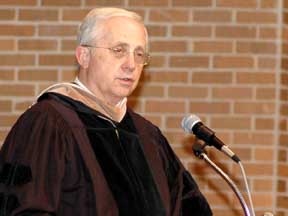
 |
|
IHL Board member, Aubrey Patterson, delivers the keynote address at Delta State’s spring commencement |
Delta State University awarded 477 degrees during spring commencement exercises held Saturday, May 9, inside Walter Sillers Coliseum on the campus.
On the day, two doctoral degrees and nine educational specialist degrees were conferred, while 126 master’s degrees and 340 bachelor’s degrees were awarded through the College of Arts and Sciences, the College of Business, the College of Education and the Robert E. Smith School of Nursing.
Delta State President, Dr. John M. Hilpert, opened the morning ceremony, congratulating the graduates and applauding the efforts of family, faculty, and friends that helped them reach the milestone achievement.
Hilpert then introduced the ceremony’s keynote speaker, Aubrey Patterson, a member of the Mississippi Institutions of Higher Learning Board of Trustees.
“Forty-five years ago I sat where you sit today and my memories of that occasion are as vivid as yours will be a half century from now,” said Patterson. “ It’s difficult for me to comprehend the magnitude of the social, economic, and yes global changes which have taken place during the years since my commencement exercises, and I suspect it will be equally so when you reflect back later in your lives.”
Patterson’s address focused on examining our country’s history during the last century and where we stand today on the world stage as we look to the new “American Century.”
“Much of what we talk about today has to do with global economics, the recession, threats to American prosperity and national security, and change. Change in all its ramifications.” said Patterson.
Patterson reflected on the post World War II industrial and economic surge that catapulted America into the position of world leadership, and global trade that reached new levels during the 20th century, further enhancing American leadership and the value of our industrial productivity.
“But the question in many people’s minds is whether the “American Century” is a thing of the past, whether America will be one of the leading countries of the world but never again be dominant,” he noted. “It’s a fair question, but one that focuses on the present and not the demonstrated ability over much more than the last 50 years of America’s ability to reinvent itself, creating change through innovation, and enhancing the productivity of our economy.”
According to Patterson, the key to the country’s future as a world leading economic power in a high tech world is education.
“Just saying education is a priority is not enough. We’ve got to commit the resources needed to ensure that our education system prepares future generations to be a part of the world’s leading economy,” said Patterson. “The good news is that we as a people always respond to a challenge and the more daunting the challenge, the stronger the response.”
In closing, Patterson encouraged graduates to take up the mantle of leadership and shared his conviction that the greatest “American Century” is the one we are embarking on.
“You will be the leaders of the new ‘American Century’ and I hope and trust that you will grasp a vision of the greatness of what has been built here and what can be built in the future,” he said. “As the saying goes, we stand on the shoulders of giants, but future generations will say that of you as well.”

